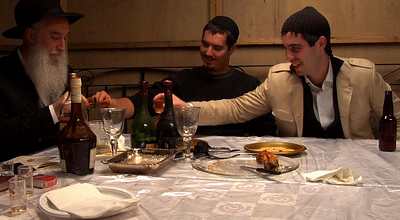Sylvain
Richard is a film critic at Arts & Opinion. He
gave Leaving the Fold, which played at the 2008
Montreal World Film Festival, 3.1 out of
4 stars. For the rest of his ratings, click
HERE.
As
per Webster’s Dictionary, a fold is an enclosure for
sheep, or the sheep contained in it. Fold also refers to the
members of a Church. To fold sheep means to contain them. To enfold means to wrap
up or envelope.
To fold sheep means to contain them. To enfold means to wrap
up or envelope.
As
the word suggests, leaving any fold is a difficult undertaking
and it is the subject of Eric Scott’s riveting documentary,
Leaving the Fold, which premiered at the 2008 Montreal
International World Film Festival.
The
docu follows the lives of five Hasidic Jews in three different
cities (Montreal, New York and Jerusalem), who no longer subscribe
to the core values of Hasidic culture.
From the opening moments of the film, director Eric Scott
goes to great pains to show that his film is not about his
personal take on Hasidism, but rather the characters who have
decided to leave the fold and pursue the secular option, which
they believe is more compatible with their longings and ambitions.
As
they turn their backs to the certainties of the past and endeavor
to embrace the new that is fraught with all sorts of hazards,
they rudely discover there is a price to pay, that on the
other side of the fence the grass is only ‘somewhat’
greener, but green enough. The dissenters are both surprised
and discomfited by the anger and ostracism from both family
and community because they have not fully grasped the implications
of their leaving, which is nothing less than a slash and burn
criticism of the culture they have rejected.
Nonetheless,
as they take up their new secular positions (Hasidism forbade
Basya from becoming a musician), they come to retrospectively
appreciate what the fold offers: relief from making major
life decisions, social and community safety nets with which
secularism can’t begin to compete and a way of life
that minimalizes risk taking. In short, they learn that leaving
the fold is more easily done physically than psychologically.
It
is to Eric Scott’s credit that we sympathize with the
leavers of the fold without aspersing Hasidism or any fold
or institution that curtails the freedom of its membership.
Scott,
who previously gave us The Other Zionist (2004) and
Je Me Souviens (1998), has provided a provocative
glimpse of what it takes and entails to leave the fold, including
folds of our own making.
My
only quibble with this fine film was with its length, only
52 minutes, which simply wasn’t enough time to spend
with Scott’s thoroughly engaging, complex characters.
For
the ratings of all the 2008 Montreal World Filmfest films,
click HERE.